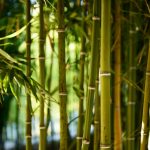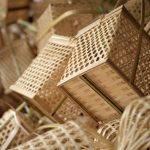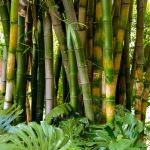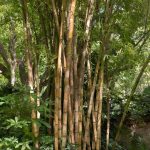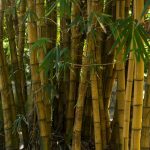Modern uses of Bamboo
Modern uses of Bamboo
Bamboo has emerged as a versatile and sustainable material in modern industries due to its
rapid growth and environmental benefits. In construction, bamboo is increasingly used as a
renewable alternative to traditional materials like steel, concrete, and wood. Its strength-to-
weight ratio makes it ideal for scaffolding, flooring, panelling, and even structural elements
in eco-friendly buildings. Architectural innovations are pushing the boundaries of bamboo’s
use in both rural housing and urban structures, especially in regions where sustainability
and cost-efficiency are prioritized.
In the textile and fashion industry, bamboo fibers are gaining popularity for producing soft,
breathable, and biodegradable fabrics. Bamboo clothing is often marketed as eco-conscious
due to its low water requirement during cultivation and minimal need for pesticides. Beyond
clothing, bamboo is also used in the production of accessories such as sunglasses, watches,
and phone cases, blending style with environmental awareness. The increasing demand for
sustainable fashion has accelerated the use of bamboo-derived fabrics in mainstream and
luxury brands alike.
Additionally, bamboo finds modern applications in consumer goods and technology. It is
used to manufacture biodegradable toothbrushes, reusable cutlery, and kitchenware,
serving as an eco-friendly replacement for plastic. Bamboo charcoal is utilized in air and
water purification systems due to its natural filtering properties. In electronics, some
companies are exploring bamboo casings for gadgets as a stylish and sustainable alternative
to metal or plastic. These modern uses highlight bamboo’s adaptability and growing
relevance in a world striving for more sustainable living practices.
Bamboo species found world wide
Bamboo is a fast-growing grass that is found in diverse climates around the world, primarily in tropical and subtropical regions but also in some temperate zones. There are over 1,400 species of bamboo across approximately 120 genera. Here’s a breakdown of major bamboo species found worldwide, grouped by region and some key genera:
- Asia (largest diversity of bamboo species)
Asia is home to more than two-thirds of the world’s bamboo species.
Key Genera:
- Phyllostachys (mostly temperate, running bamboos)
- Bambusa (clumping, tropical/subtropical)
- Dendrocalamus (giant tropical clumping bamboos)
- Gigantochloa
- Thyrsostachys
Notable Species:
- Phyllostachys edulis (Moso bamboo) – China; used for timber and shoots.
- Bambusa vulgaris – Widespread in tropical Asia; widely cultivated.
- Dendrocalamus giganteus – One of the largest bamboo species; Southeast Asia.
- Phyllostachys nigra (Black bamboo) – Native to China; ornamental.
- Thyrsostachys siamensis – Thailand and neighboring countries.
- Africa
Africa has fewer native bamboo species but still includes some important ones.
Key Genera:
- Oxytenanthera
- Yushania
- Bambusa (introduced)
Notable Species:
- Oxytenanthera abyssinica – Found in sub-Saharan Africa; drought-resistant.
- Yushania alpina (African alpine bamboo) – Grows in highlands of East Africa.
- Americas (North, Central, South)
The Americas are home to about 400+ native bamboo species, especially in South America.
Key Genera:
- Guadua (tropical South America, especially Colombia, Ecuador, Brazil)
- Chusquea (high elevation Andes and Central America)
- Arundinaria (temperate North America)
- Otatea (Mexico)
- Aulonemia
Notable Species:
- Guadua angustifolia – Used as a strong construction material in Colombia.
- Chusquea culeou – Chile and Argentina; cold-hardy.
- Arundinaria gigantea (Giant cane) – Southeastern USA; only native bamboo in U.S.
- Otatea acuminata – Mexico; drought-tolerant ornamental.
- Australia and Oceania
Fewer native bamboos, but some introduced species are naturalized.
Native Genera:
- Bambusa arnhemica – Northern Australia.
- Some Schizostachyum species in Papua New Guinea and nearby islands.
- Europe
- No native bamboo species.
- Several species (mainly Phyllostachys) are cultivated in gardens and parks.
Bamboo species found in India
India is home to a rich diversity of bamboo species due to its varied climate and geography. There are over 130 species of bamboo in India, belonging mainly to the Poaceae family (grass family), under the Bambusoideae subfamily. These species are found across tropical, subtropical, and temperate regions.
Here’s a list of notable bamboo species found in India:
Common Bamboo Species in India
|
Scientific Name |
Common Name |
Region Found |
|
Bambusa bambos |
Giant Thorny Bamboo / Indian Thorny Bamboo |
Peninsular India, Eastern Ghats, Central India |
|
Bambusa tulda |
Bengal Bamboo |
Northeast India, West Bengal, Assam |
|
Dendrocalamus strictus |
Male Bamboo / Solid Bamboo |
Central India, Western India, Deccan Plateau |
|
Dendrocalamus hamiltonii |
Hamilton’s Bamboo |
Northeastern India, Himalayan foothills |
|
Dendrocalamus giganteus |
Giant Bamboo |
Northeast India, Assam, Arunachal Pradesh |
|
Bambusa nutans |
Nodding Bamboo |
Northeast India, Himalayan foothills |
|
Bambusa vulgaris |
Common Bamboo |
Cultivated throughout India |
|
Melocanna baccifera |
Muli Bamboo |
Northeast India (especially Mizoram, Tripura, Assam) |
|
Ochlandra travancorica |
Reed Bamboo |
Western Ghats (Kerala, Karnataka, Tamil Nadu) |
|
Schizostachyum pergracile |
Graceful Bamboo |
Northeast India |
Regions with Rich Bamboo Diversity in India
- North-East India: Assam, Mizoram, Manipur, Nagaland, Tripura – ~66% of India’s bamboo resources.
- Western Ghats: Kerala, Karnataka, Tamil Nadu – home to reed bamboos like Ochlandra species.
- Central India: Madhya Pradesh, Chhattisgarh – dominated by Dendrocalamus strictus.
- Himalayan Region: Sikkim, Uttarakhand – cooler-loving bamboos like Arundinaria species.
Interesting Facts
- India is the second-largest producer of bamboo in the world, after China.
- Bamboo plays a vital role in rural economies – used for construction, furniture, handicrafts, paper, and even food.
- Species like Melocanna baccifera are known for mass flowering every 48 years, which leads to Mautam (a famine-like situation due to rat infestation).
Would you like:
- A map showing bamboo regions in India?
- Info on uses of specific species?
- Details on bamboo cultivation and policy in India?


